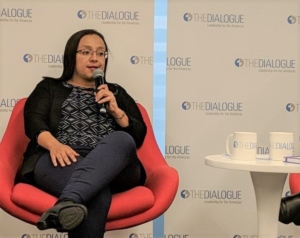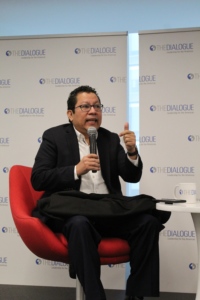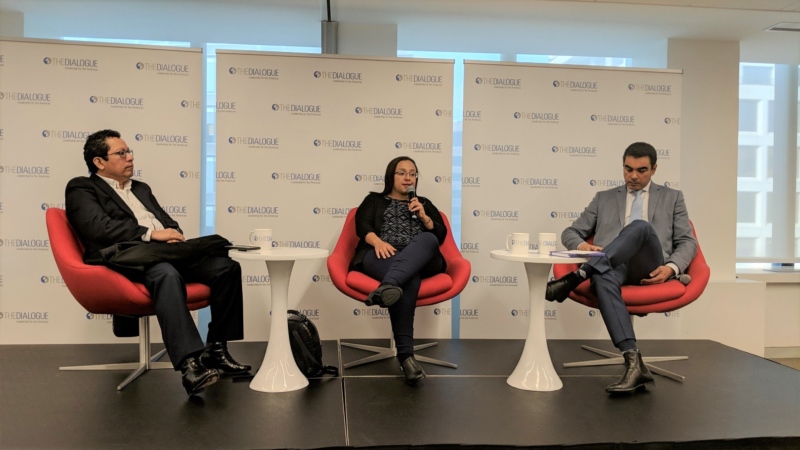
Violence & Impunity: Protecting Journalists in Colombia & Mexico
Violence against journalists is fortunately uncommon in many Latin American countries. But in some parts of the region it is of great concern.
On November 19, 2019, the Inter-American Dialogue, in partnership with the Committee to Protect Journalists, hosted an event titled “Attacks on Press Freedom in Nicaragua.” It featured panelists Lucía Pineda Ubau, News Director at 100% Noticias, Miguel Mora, Director and Founder of 100% Noticias, and was moderated by Manuel Orozco, Director of the Migration, Remittances and Development Program at the Inter-American Dialogue. The conversation centered around the Nicaraguan government's persistent attempts to stifle freedom of expression since anti-government protests broke out in April 2018.
[caption id="attachment_90299" align="alignleft" width="300"] Lucía Pineda Ubau[/caption]
Lucía Pineda Ubau[/caption]
Pineda began the conversation by describing how freedom of expression has deteriorated in Nicaragua because of the Ortega administration's continued crack down on dissenters. Since protests began in April 2018, over 400 people have been assassinated by government agents or accomplices. University students and young people are the most common victims, and at least 30 children have been shot and killed.
Over the past two weeks, state suppression of public discourse has intensified and violence against dissenters and sympathizers has increased at the hands of state actors. Mora revealed that, just prior to the April 2018 protests, he received a visit from a government official who asked the news outlet not to cover the upcoming protests nor the government's response to them. He also requested that 100% Noticias stop providing independent journalists with a platform and physical work space and threatened that the authorities 'could not be held responsible if anything happens to [the journalists]. Pineda emphasized how precarious the conditions for conducting journalism have become in Nicaragua when she pointed out that, "the only tools we have are our phones. Basic protective gear like bulletproof vests aren't available."
[caption id="attachment_90303" align="alignright" width="200"] Miguel Mora[/caption]
Miguel Mora[/caption]
Mora stated that the public outrage in Bolivia that resulted in President Evo Morales stepping down has caused the Ortega regime to respond even more harshly to criticism and protest.
Journalism under a dictatorial regime is full of challenges, said Mora. For over 20 years, 100% Noticias broadcasted on Channel 15 from Managua, Nicaragua. However, due to increasing government censure and persecution, which included having their operating license revoked, 100% Noticias, like many other media outlets, have found the internet and social media to be the only mediums for getting their reporting out because the government controls all radio and TV broadcasting in Nicaragua. Approximately 46% of residents have access to the internet, and 60% of people get their news through internet sources, including social media. Investigative journalism is possible, but corroborating information and presenting a complete picture of the facts is difficult when journalists are unable to access local sources. As a result of government censure, marketing income for 100% Noticias has decreased to less than 10% of what it was prior to April 2018, but the outlets' relevance is greater than ever, emphasized Mora.
Pineda further added her concern that government censorship might soon extend to online media and that the government might cut off access to specific web pages or to the internet as a whole. Vice President Rosario Murillo had already taken steps to do so when she introduced a law to control internet and media access shortly before the April 2018 protests. On a positive note, Mora revealed that the current crisis has spurred increased collaboration among the approximately 1,000 Nicaraguan journalists working inside and outside of Nicaragua to publish the truth about the country's current situation. There is a tacit agreement among these journalists to collaborate, share news and information, and sometimes even coordinate openly.
The Question and Answer session focused on the effects of international pressure and the implications of U.S. sanctions. Pineda stated that U.S. has shown solidarity with them as persecuted journalists and has helped them strengthen their protest against the status quo. Meanwhile, Mora conceded that U.S.-imposed sanctions might be difficult for the country to endure but recognized that they are necessary for pressuring the Ortega-Murillo regime and its inner circle to make concessions. The regime is currently holding the Nicaraguan people hostage and isolated.
Violence against journalists is fortunately uncommon in many Latin American countries. But in some parts of the region it is of great concern.
As organized crime and gang violence continues to spread throughout the isthmus, violent threats against journalists have been on the rise.
Is press freedom seriously jeopardized in these countries or elsewhere in the region? What implications does it have for the state of democracy? Should regional bodies or other organizations be taking action? If so, how?
 Laura Porras | Inter-American Dialogue
Laura Porras | Inter-American Dialogue